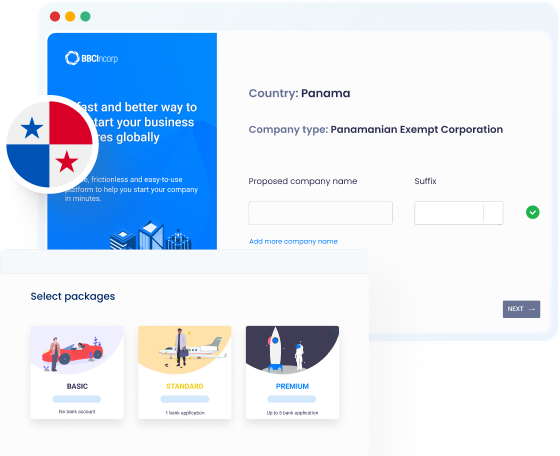Navigating the Globe of International Service: Insights on Offshore Company Formation
Offshore Company Formation provides a calculated avenue for worldwide company operations. It uses remarkable benefits, such as tax optimization and boosted personal privacy. Nonetheless, the procedure is not without its challenges. Understanding the intricacies of different jurisdictions and regulatory needs is necessary. As services think about these alternatives, the actions entailed can substantially affect their long-term success. What are the vital variables that can result in efficient overseas administration?
Understanding Offshore Firms: Meaning and Purpose
Offshore companies have become a centerpiece in international organization conversations due to their one-of-a-kind legal and economic structures. These entities are developed in territories outside of the owner's nation of residence, frequently with desirable regulative atmospheres. Commonly, overseas companies offer different objectives, such as property defense, tax optimization, and boosted privacy. They can operate in several fields including finance, trade, and modern technology, offering adaptability for international operations.The specifying attribute of an overseas Company is its capacity to carry out business globally while gaining from reduced tax obligation liabilities and governing burdens. This structure attract investors and entrepreneurs seeking to diversify their portfolios and handle risks efficiently. Furthermore, lots of overseas territories provide rewards to draw in foreign financial investment, bring about a rise in the Formation of these companies. Understanding the meaning and purpose of overseas companies is necessary for navigating through the intricacies of worldwide commerce and resources flow.
Key Advantages of Offshore Company Formation
The Formation of an offshore Company uses numerous engaging advantages that bring in investors and business owners alike. Among the primary advantages is tax optimization; many territories supply beneficial tax obligation prices or exemptions, enabling companies to maximize earnings. Furthermore, offshore business typically enjoy higher privacy, as several jurisdictions have rigorous personal privacy legislations protecting the identities of Company owners and shareholders.Another significant advantage is possession defense. Offshore entities can secure assets from political instability and financial recessions in the owner's home country. In addition, these business can help with global profession, providing simple accessibility to global markets and simplifying cross-border transactions.The flexibility in company structure also allures to company owner, as overseas companies can be customized to meet specific functional requirements. Generally, the calculated Formation of an offshore Company can bring about enhanced economic safety and security, functional performance, and a durable global existence.

Typical Challenges in Establishing Offshore Entities
Establishing overseas entities offers numerous difficulties that services need to navigate. Trick problems consist of regulative conformity, which can vary considerably throughout jurisdictions, and the effect of cultural distinctions on procedures. Furthermore, organizations have to take into consideration the expenses and risks connected with preserving an offshore existence, which can influence general stability.
Regulatory Conformity Issues
When they seek to develop offshore entities, navigating regulatory conformity issues postures considerable difficulties for businesses. Each territory has its own collection of laws and legislations, which can differ commonly and may be tough to browse. Companies usually deal with obstacles related to tax obligation compliance, anti-money laundering guidelines, and reporting needs. Additionally, modifications in worldwide tax obligation laws can create unpredictability, making it crucial for organizations to remain upgraded on conformity obligations. Failure to stick to these guidelines can cause severe charges, consisting of penalties and reputational damage. Involving and understanding the legal structure with neighborhood professionals is necessary for effective offshore procedures, making sure that businesses can run within the confines of the legislation while optimizing their global method.
Social Distinctions Effect

Price Factors To Consider and Dangers
Guiding via the monetary landscape of offshore entity Formation offers various cost considerations and integral risks. Initial setup prices frequently include legal costs, registration costs, and compliance fees, which can build up substantially. Additionally, ongoing upkeep expenses such as annual charges and accountancy services have to be factored in. In addition, changing regulatory settings in various jurisdictions pose risks, potentially leading to unforeseen expenses or legal complications. Businesses might additionally encounter obstacles associated with taxation, banking, and reputational concerns, which can influence earnings and operational effectiveness. Prospective business owners must perform complete due diligence and financial forecasting to alleviate these risks and ensure lasting growth. Understanding these expense factors to consider is crucial for successful overseas business ventures.
Actions to Set Up an Offshore Company
Establishing an offshore Company includes numerous important steps that require careful factor to consider. Secret aspects consist of choosing the appropriate territory and ensuring conformity with local guidelines, along with gathering needed documents. Understanding these aspects is necessary for an effective overseas organization configuration.
Selecting the Right Territory
Choosing the right territory is vital for anyone wanting to set up an offshore Company, as it can substantially affect business's legal obligations, tax obligation responsibilities, and functional simplicity. Different elements should be thought about, including the political stability, governing environment, and tax obligation rewards provided by possible territories. Popular selections commonly include nations with beneficial tax routines, such as the British Virgin Islands or Cayman Islands, due to their reduced or absolutely no tax prices. Furthermore, the convenience of working and the credibility of the territory can influence investor self-confidence and market gain access to. Inevitably, a knowledgeable decision based on complete research will ensure the overseas Company is placed for lasting success and compliance with global standards.
Needed Paperwork and Compliance
When establishing an offshore Company, comprehending the essential documentation and conformity demands is necessary to ensure a smooth procedure. Trick documents commonly include a certificate of consolidation, a memorandum and short articles of organization, and evidence of identification for investors and supervisors. Some territories might call for additional information, such as company strategies or bank recommendations. Compliance with local regulations is important, which commonly entails assigning a registered representative and keeping a licensed workplace. Regular reporting and adherence to tax obligations must likewise be thought about. Failing to follow these requirements can cause charges and even dissolution of the Company. Complete prep work and examination with legal specialists can help browse these complexities successfully.
Picking the Right Territory for Your Offshore Company
Exactly how can one determine the most suitable territory for an overseas Company? Choosing the best territory needs mindful factor to consider of numerous elements. First, the legal and tax environment plays an essential function; territories with desirable tax obligation routines may boost business profitability. Furthermore, the political stability and economic climate of a location can affect long-term company viability.Another crucial element is the schedule of financial services and banking framework, which assist in smooth procedures. Prospective company proprietors ought to likewise take into consideration the simplicity of working, including the speed of registration and the clarity of regulations.Furthermore, language barriers and social differences can affect operations; for that reason, straightening with a territory that lines up with service objectives and individual convenience is necessary. Inevitably, comprehensive research study and specialist advice can direct entrepreneurs in making an informed choice that lines up with their critical purposes.
Compliance and Regulative Factors To Consider

Finest Practices for Managing an Offshore Organization
Handling an overseas business requires strategic preparation and meticulous execution to maximize performance and alleviate risks. First, developing a robust conformity structure is important to navigate differing regulations across territories. Regular audits and threat assessments assist recognize potential vulnerabilities.Moreover, leveraging regional expertise through partnerships with regional professionals can improve operational performance and social understanding. Making use of innovation, such as cloud-based monitoring systems, streamlines communication and data administration, making it possible for far better decision-making. Additionally, keeping transparent financial records and making certain timely tax obligation filings are vital to support the Company's integrity. Investing in personnel website training and advancement fosters a knowledgeable labor force, advertising innovation and adaptability.Finally, establishing clear efficiency metrics and crucial efficiency indications (KPIs) assists examine business development and notify strategic modifications. By adhering to these best practices, firms can properly manage their overseas operations, guaranteeing long-term success and sustainability in an affordable international market.
Often Asked Concerns
What Is the Cost of Developing an Offshore Company?
The cost of creating an overseas Company differs commonly depending on territory, legal requirements, and solutions required. Normally, expenses can range from a couple of hundred to a number of thousand dollars, consisting of registration, conformity, and annual costs.
For how long Does It Take to Establish an Offshore Entity?
The moment called for to develop an offshore entity differs considerably, normally varying from a couple of days to a number of weeks (offshore company formation). Factors influencing this period consist of jurisdiction, called for documents, and the effectiveness of the provider entailed
Can People Form Offshore Companies Without a Business Partner?
People can indeed form overseas companies without a business companion. Several jurisdictions allow single-member entities, equipping entrepreneurs to establish and handle their organizations independently, while still taking advantage of possible tax obligation advantages and legal securities.
Exist Any Type Of Tax Obligation Advantages for Foreign Investors?

What Sort Of Organizations Frequently Make Use Of Offshore Companies?
Offshore business are regularly used by numerous sectors, including financing, ecommerce, and innovation. These entities typically offer functions such as property protection, tax obligation optimization, and privacy, interesting both international corporations and individual business owners. Offshore firms have ended up being a focal point in worldwide company discussions due to their unique legal and financial structures. They can operate in several fields including money, modern technology, and profession, supplying adaptability for global operations.The defining feature of an offshore Company is its capacity to perform company internationally while profiting from reduced tax obligation obligations and governing worries. Additionally, overseas business usually take pleasure in better confidentiality, as many jurisdictions have stringent personal privacy laws protecting the identifications of Company owners and shareholders.Another significant benefit is possession protection. These business can facilitate international trade, providing simple access to global markets and streamlining cross-border transactions.The versatility in corporate framework also charms to service proprietors, as overseas firms can be customized to satisfy specific operational requirements. Choosing the best territory is essential for anybody looking to establish up an offshore Company, as it can considerably affect the organization's legal responsibilities, tax liabilities, and operational ease.